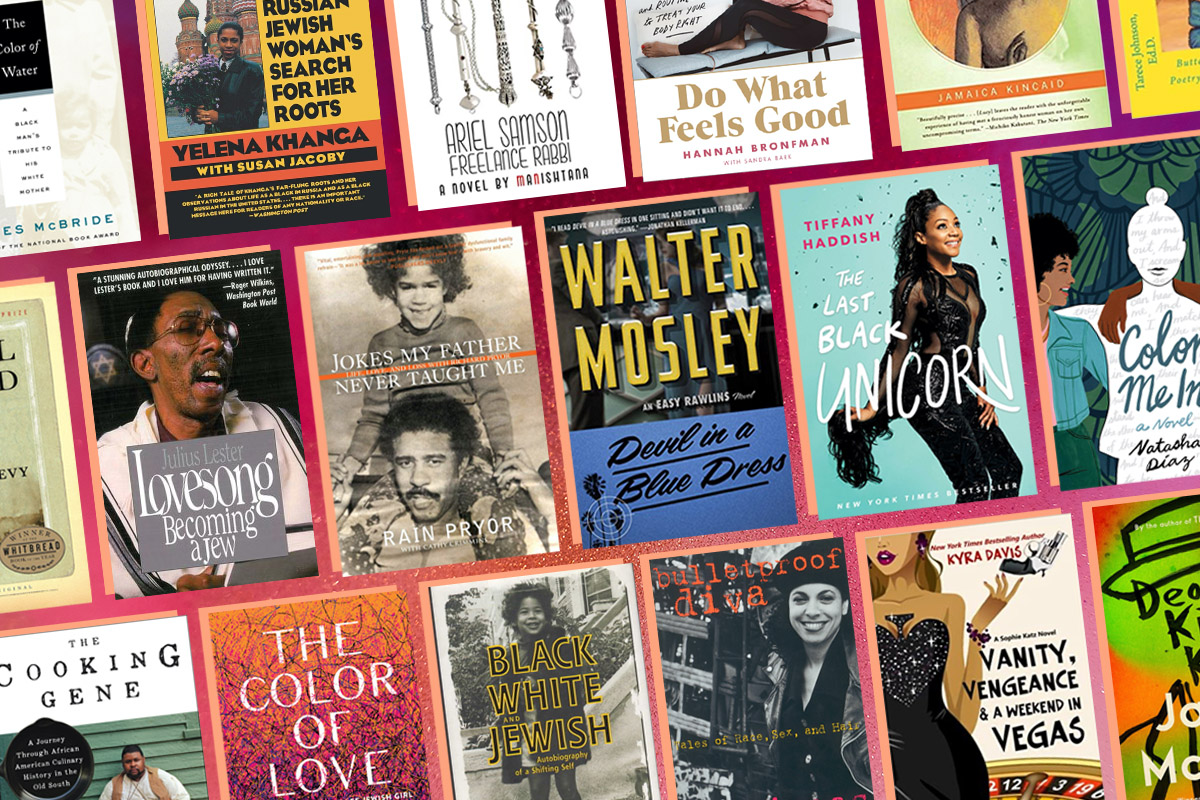Apropos of, well, everything, we decided it was well past time to give you a list of books by Black Jewish authors to read. From memoirs and novels to poetry and YA, these books deserve your attention not just now, as anti-Black racism is at the forefront of discourse in America, but as part of your ongoing reading practice.
This entire list is shoppable on Bookshop, a platform that supports independent bookstores. You can also consider buying directly from one of these Black-owned independent bookstores. Also, this list is in no way comprehensive. It is just a start. Happy reading!!
Memoir
1. The Color of Love: A Story of a Mixed-Race Jewish Girl by Marra B. Gad
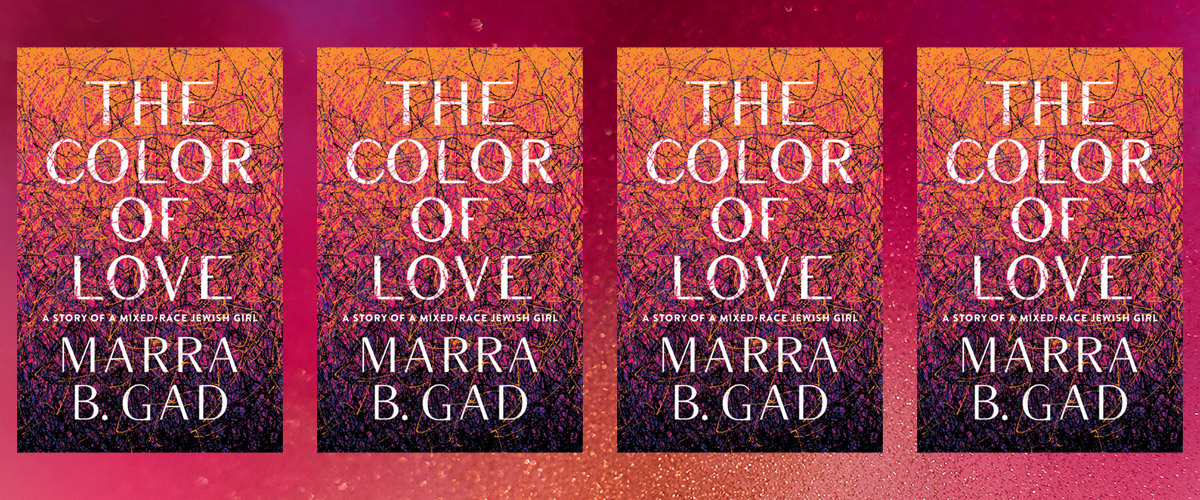
“Jewish boys didn’t want to explain my brown skin. And black boys could not understand or embrace my Judaism,” Marra Gad writes in her powerful memoir The Color of Love. Born in New York City in April 1970 to a white Jewish mother and a Black non-Jewish dad, she was adopted by a white Jewish family in Chicago three days after her birth. Largely focused on her childhood in Chicago, she writes about the racism she encountered from her community and extended family alike.
“Often, people want me to give answers I can’t give and to tell them that things are better now than they were in the ‘70s, ‘80s, ‘90s. Often proud grandparents show me photographs of their gorgeous bi and multiracial grandchildren and want me to promise that their grandchildren won’t experience the things that I have,” Gad said in an interview. “I pray that someday, I will be able to do just that. But sadly, I cannot yet.”
Fun fact: Marra Gad is a film producer! Notably, she produced Girl Most Likely staring Kristin Wiig and Annette Bening in 2012. Get The Color of Love here.
2. Black White and Jewish: Autobiography of a Shifting Shelf by Rebecca Walker

Rebecca Walker is the daughter of famous Black writer Alice Walker and Jewish lawyer Melvyn Rosenman Leventhal. Mel and Alice divorced when Rebecca was 7 years old, and she grew up splitting her time between her dad’s community in Riverdale, a Jewish neighborhood in the Bronx, and her mom’s predominately Black community in San Francisco. Her book details the early years of her life in Mississippi (Alice and Mel were active in the Civil Rights Movement) and growing up with very different parents.
Fun fact: At age 22, Rebecca Walker coined the concept “Third-wave feminism.” Get Black White and Jewish here.
3. The Last Black Unicorn by Tiffany Haddish
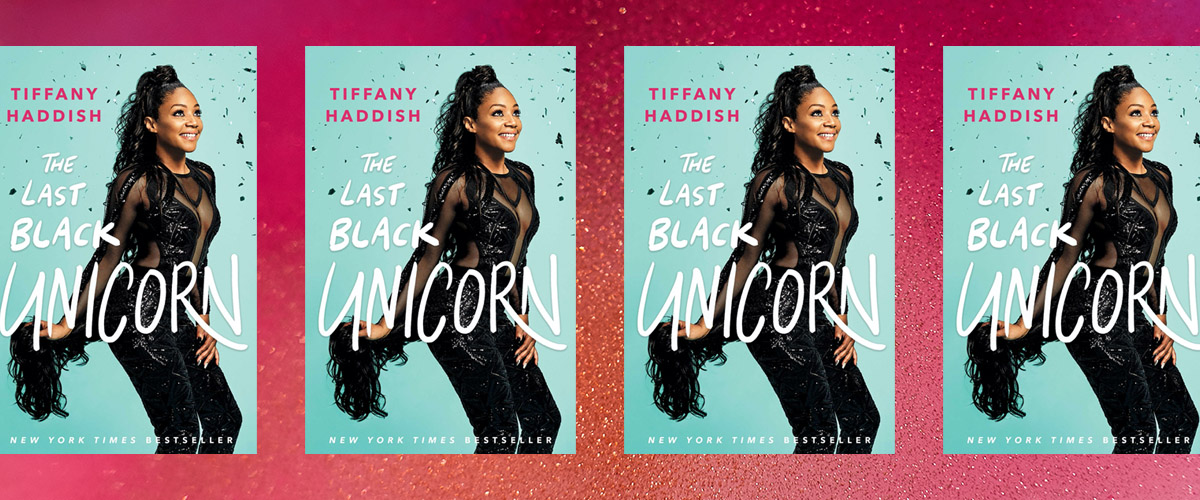
Tiffany Haddish met her dad, an Eritrean Jew, for the first time when she was 27 years old. It ultimately sent her down a journey of understanding her Jewish and Eritrean heritages, and this past December, she officially became a bat mitzvah. (Her bat mitzvah was a powerful affirmation for Black Jews everywhere.) The Last Black Unicorn, Haddish’s memoir, takes us through her childhood and her journey into comedy. Like many other Jews of Color, Haddish has experienced her fair share of racism and discrimination when entering predominantly white Jewish spaces. But, as she told Alma this past winter, “I have no problem saying: This is where I’m supposed to be.”
Fun Fact: Billy Crystal had an aliyah at Tiffany’s bat mitzvah, and we’ll honestly never be over it. Get The Last Black Unicorn here.
4. The Color of Water: A Black Man’s Tribute to His White Mother by James McBride

First published in 1995, James McBride’s memoir tells the story of his mother, Ruchel Dwajra Zylaska (later Rachel Deborah Shilsky, then Ruth McBride Jordan). Ruth immigrated to American from Poland; she was the daughter of an Orthodox rabbi. In 1942, Ruth, a white woman, converted to Christianity and married James’s father, Rev. Andrew Dennis McBride, a Black man. Ruth and Dennis would go on to have eight children, including James; after Dennis’s death, she remarried, and they had four children. The Color of Water is James’s attempts to understand his mother and how she raised 12 Black children; growing up, he would ask her where she was from, and she’d reply, “God made me.” He writes about how his mom sent her children to schools in Jewish neighborhoods, and how through education, she “conveyed her Jewishness to us.” On James’s own Jewish identity, he explained, “I’m proud of my Jewish history. Technically I guess you could say I’m Jewish since my mother was Jewish…but she converted [to Christianity]. So the question is for theologians to answer. It doesn’t cause me one drop of blood, sweat or tears. I just get up in the morning happy to be living.”
Fun fact: James McBride professionally plays the saxophone! Get The Color of Water here.
5. Lovesong: Becoming a Jew by Julius Lester

Julius Lester is perhaps best known for his children’s books, but his memoir, Lovesong, should absolutely not be overlooked. But let’s back up: Lester was born the son of a minister in St. Louis, Missouri in 1939. Lester largely grew up in Kansas City, Kansas and Nashville, Tennessee. During the Civil Rights Movement, he was involved in the Student Nonviolent Coordinating Committee and the Black Power movement, and performed as a folk singer. In 1982, Lester converted to Judaism, and served as lay religious leader of Beth El Synagogue in St. Johnsbury, Vermont. Lovesong begins with this powerful message:
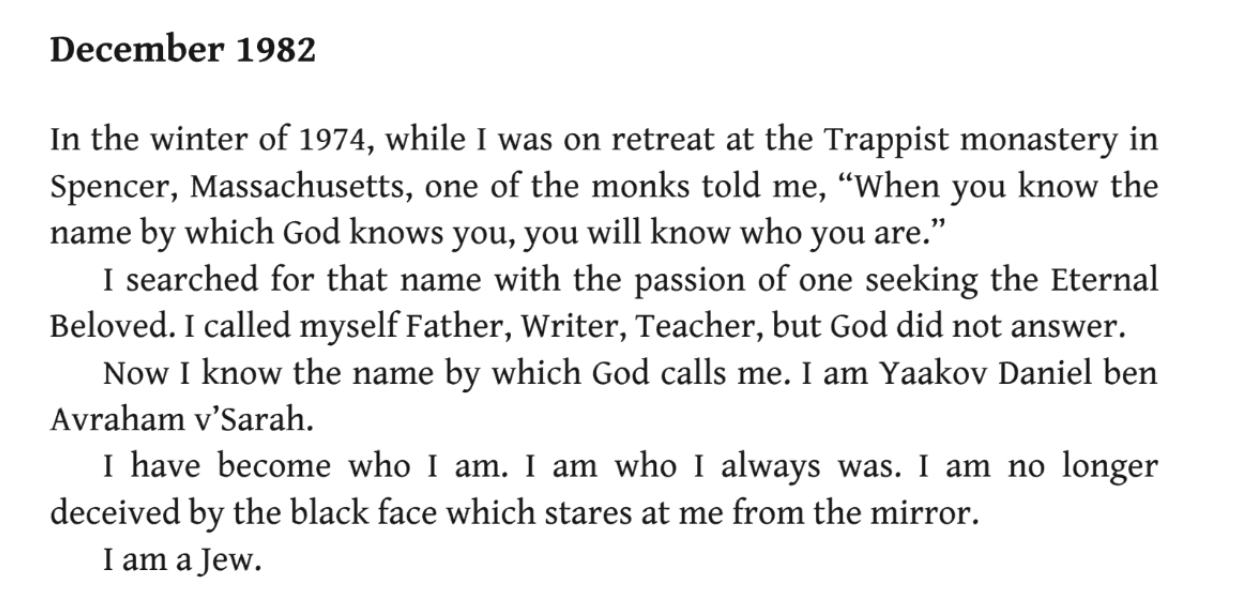
Fun fact: Julius Lester hated Hanukkah. Get Lovesong here.
6. Jokes My Father Never Taught Me: Life, Love, and Loss with Richard Pryor by Rain Pryor
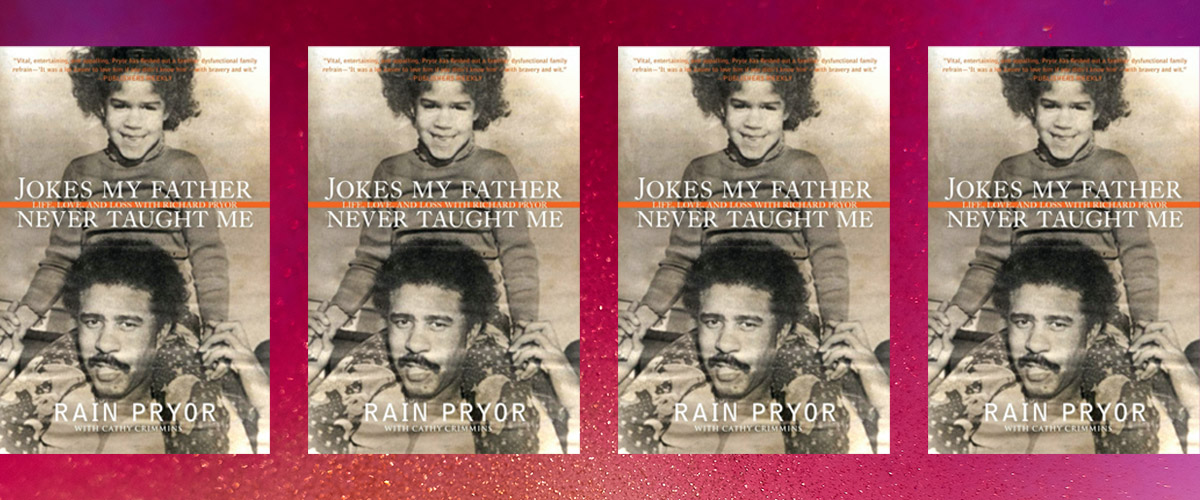
Rain Pryor is a successful actress, writer, and comedian. Oh, and she’s the daughter of legendary comedian Richard Pryor — Jewish actress and go-go dancer Shelley Bonis was Pryor’s second wife. In her memoir, Rain writes all about her childhood split between her father and mother’s families and homes. Here, have a description: “In this intimate, harrowing, and often hilarious memoir, Rain talks about her divided heritage … In her father’s house, she bonded with Richard’s grandmother, Mamma, a one-time whorehouse madam who never tired of reminding Rain that she was black. In her mother’s house, and in the home of her Jewish grandparents, Rain was a ‘mocha-colored Jewish princess,’ learning how to cook everything from kugel to beef brisket.” It’s messy and loving and raw.
Rain also explores her Black Jewish identity in her solo show Fried Chicken and Latkes, talking about racism in the 1960s and ’70s as she was mainly raised by her white Jewish grandparents. As she explains, “Fried Chicken and Latkes is derived from my being born a product of an iconic father, Richard Pryor, and a social activist/Jewish mother, Shelley Bonis, who believed my birth was going to change America.”
Fun fact: Rain is also a jazz/blues vocalist. Get it here.
7. Soul to Soul: A Black Russian Jewish Woman’s Search for Her Roots by Yelena Khanga with Susan Jacoby
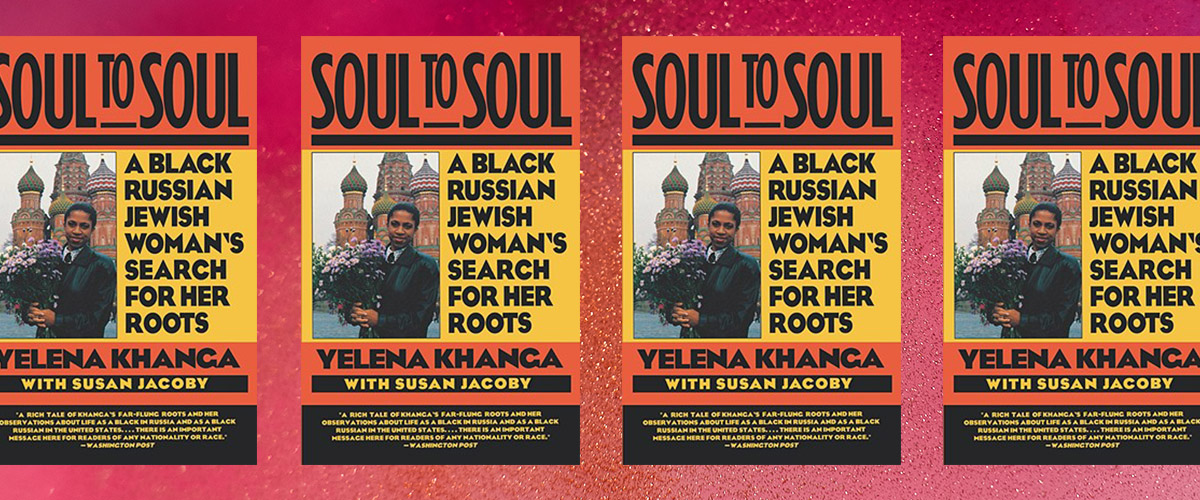
A remarkable family history is detailed in Soul to Soul. Yelena Khanga’s great-grandfather, Hilliard Golden, was born a slave. Her grandfather, Oliver Golden, studied agronomy at Tuskegee Institute, and served in the Army during World War I. After returning home, he was unable to find employment — and ended up joining the Communist Party. Arrested during a union demonstration, he met fellow demonstrator Bertha Bialek, a Jewish woman born in Warsaw. Oliver and Bertha soon married. In 1931, they left New York City for the Soviet Union, where they welcomed a daughter, Lily. Lily Golden grew up in the Soviet Union and became the first Black student at Moscow State University, and went on to teach at the African Institute in Moscow. Lily married Abdullah Khanga, a Zanzibari politician, and they had one daughter, Yelena. A few months after Yelena’s birth, Abduallah returned to Zanzibar in 1962. He was executed in 1969. Yelena grew up with three generations of women living under the same house — Bertha, Lily, and herself. “Chronicling three generations of racial and ethnic pride, Khanga turns a critical eye toward racism, feminism, Communism, and democracy, and examines these ideas and institutions as they relate to her experiences in the US and abroad,” Kirkus Reviews writes.
Fun fact: After Yelena Khanga published her memoir, her mom, Lily Golden, also wrote a memoir called My Long Journey Home. Get Soul to Soul here.
Fiction
8. Ariel Samson: Freelance Rabbi by MaNishtana
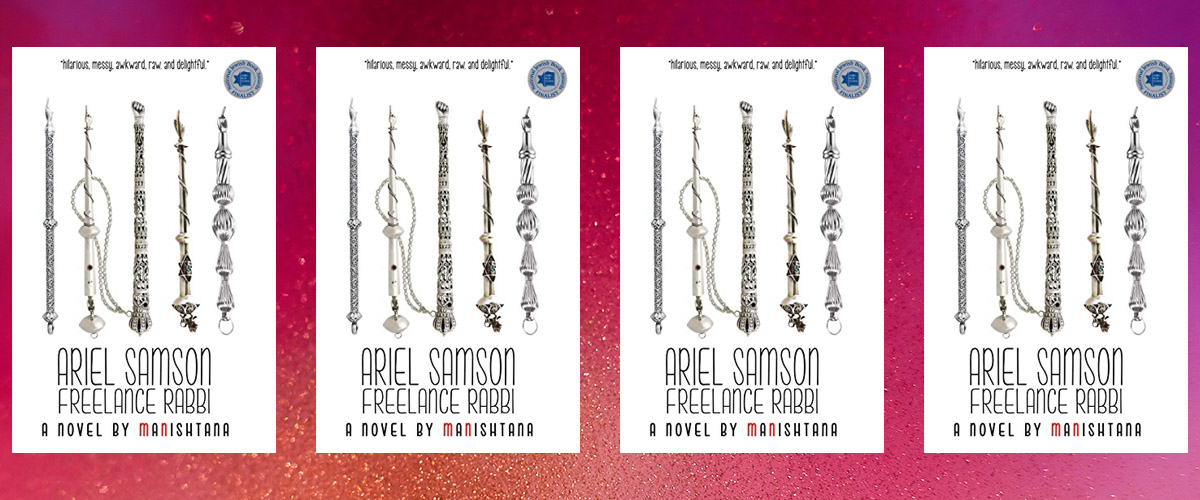
Orthodox rabbi Shais Rishon writes under the penname MaNishtana, and Ariel Samson is his semi-autobiographical novel. Ariel is a 20-something Black rabbi navigating life and work in the Jewish community in NYC. As JTA explains, “many of the racist experiences Ariel faces within the Jewish community are either based on his own life or stories told to him by other Jews of color. One episode, in which Ariel confronts an Orthodox New York assemblyman over wearing a blackface costume on Purim, is a ‘verbatim’ recollection of a conversation that Rishon had with a real local politician who did that.”
Rishon grew up in a Black Jewish family in the Chabad movement in Brooklyn — though he no longer identifies with Chabad, just as Orthodox — and he is a powerful writer and educator. “I’m an African-American author, yes, and a Jewish-American author, yes — both. To put the Jew of color entry into Jewish American fiction.” Hell, yes.
Fun fact: Rabbi Rishon’s twitter, @MaNishtana, is amazing. If you’re on Twitter, follow him. Get Ariel Samson here.
9. Small Island by Andrea Levy

Andrea Levy’s Small Island tells the story of four Jamaican immigrants in 1948 in England. The novel was adapted into a BBC show in 2009, and for stage in April 2019. Levy, herself born in London to Jamaican parents, focuses on British Jamaican identity in her work.
Levy’s grandfather was an Orthodox Jewish man who later converted to Christianity after World War I. However, Levy claims her Jewish heritage. As she told Haaretz in 2006, “I don’t know that side of my family and I’m now desperately trying to trace beyond my grandfather, into that Jewish line, but I haven’t had much luck so far. I love having these wonderful levels of identities, I think they’re coming from Jamaica, which has so many different people from different places. I think I have every single person that ever lived in Jamaica roaming around my genes somewhere.”
Fun fact: Levy’s other famous novel, The Long Song, was nominated for the Man Booker Prize in 2010. Get Small Island here.
10. PeaceSong DC by Carolivia Herron
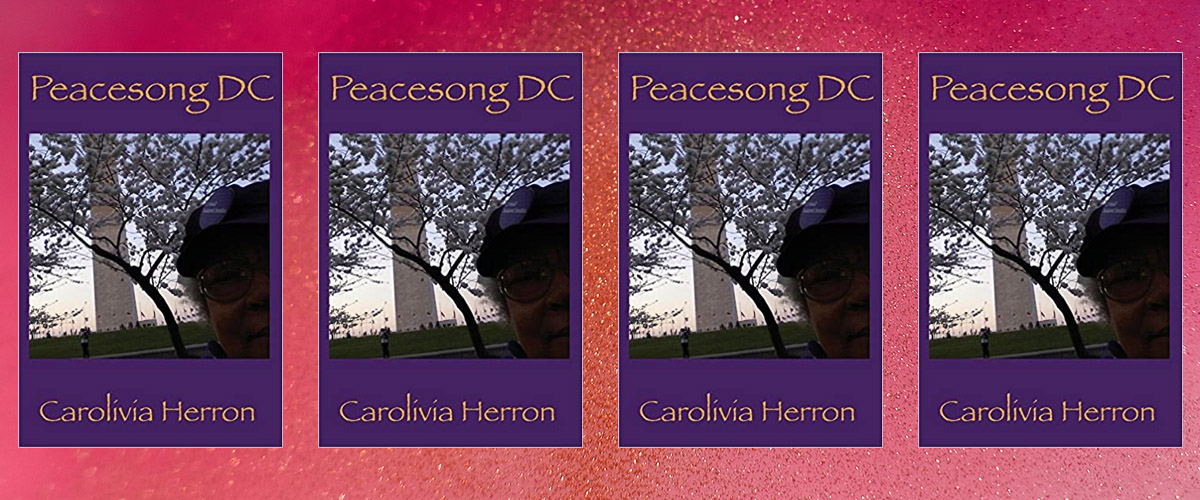
Subtitled “A Jewish Africana Academia Epic Tale of Washington City,” PeaceSong DC is an absolutely epic read. “Shirah Shulamit Ojero has four loves: her African American culture, her Jewish heritage, academic study — especially the study of literary epics — and her city, Washington, DC. Peacesong DC displays the interconnection of these four loves as Shirah grows up,” explains the book description. “Although all of the stories told in Peacesong DC are based on actual events in the author’s life, the book is classified as fiction rather than non-fiction because the stories bend toward the arc of storytelling rather than that of rigid facts.”
Herron, herself born in D.C. in 1947, converted to Judaism at age 47. She explained, “When my mom, who had originally been less enthusiastic, saw me in synagogue with the Torah, she told me, ‘You’ve been Jewish all your life. I just didn’t know it.’” In researching her family history, she found that she was descended from Sarah Shulamit, a Sephardic Jew.
Fun fact: Carolivia Herron is actually best known for her children’s books, like Nappy Hair and Always an Olivia. Get PeaceSong DC here.
11. Lucy by Jamaica Kincaid
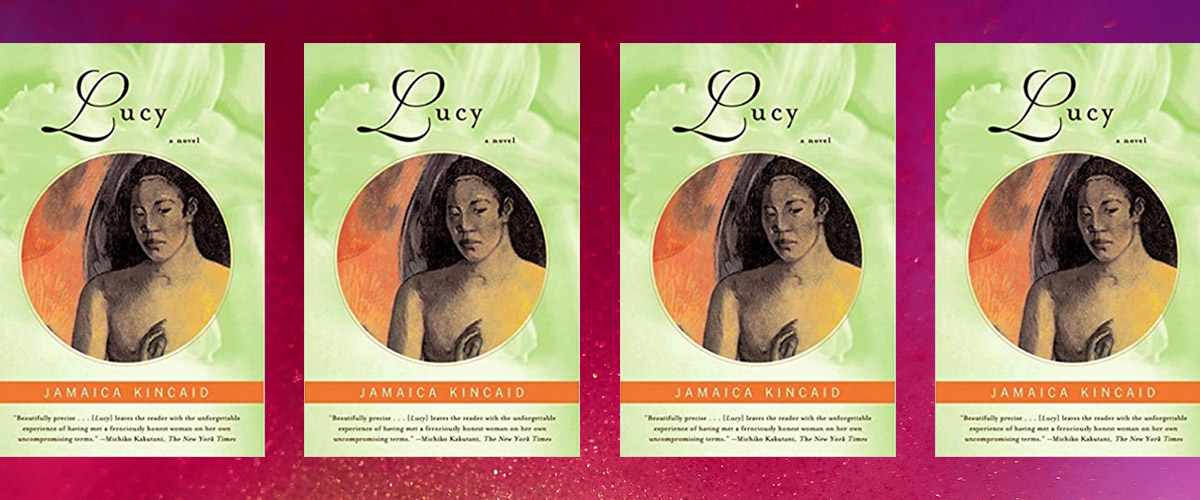
Alma contributor Nylah Burton writes about Lucy in “9 books to read by Jews of Color“: “Kincaid converted to Judaism in 1993, after over a decade of being married to the Jewish composer Allen Shawn. Telling Tablet Magazine of her decision to convert, Kincaid said a rabbi told her that she and her children wouldn’t be buried in the same cemetery if she didn’t. Kincaid remembers thinking, ‘What if there’s a Jewish heaven and I’m in the other heaven and I’d have to send them letters?’ I couldn’t bear to be separated from them.’ After her divorce, when people asked Kincaid if she would return to Christianity, she thought it was ludicrous, saying, ‘People ask me if I’m still a Jew and it’s like, do you think Judaism is a fashionable skirt?'”
Kincaid’s work may not be explicitly Jewish, but it’s firmly rooted in an experience that many Caribbean Jews of Color can identify with. Themes of colonial legacies, complicated familial relationships, racism, and class ripple through her writing. There are so many books of Kincaid’s to read and they’re all worth it, but I would suggest starting with Lucy, a story of a West Indian girl who leaves her home to work for a white family. The story is loosely autobiographical, mirroring Kincaid’s own experiences.”
Fun fact: This is not a fun fact but just my favorite Jamaica Kincaid quote: “The inevitable is no less a shock just because it is inevitable.” Get Lucy here.
12. Deacon King Kong by James McBride
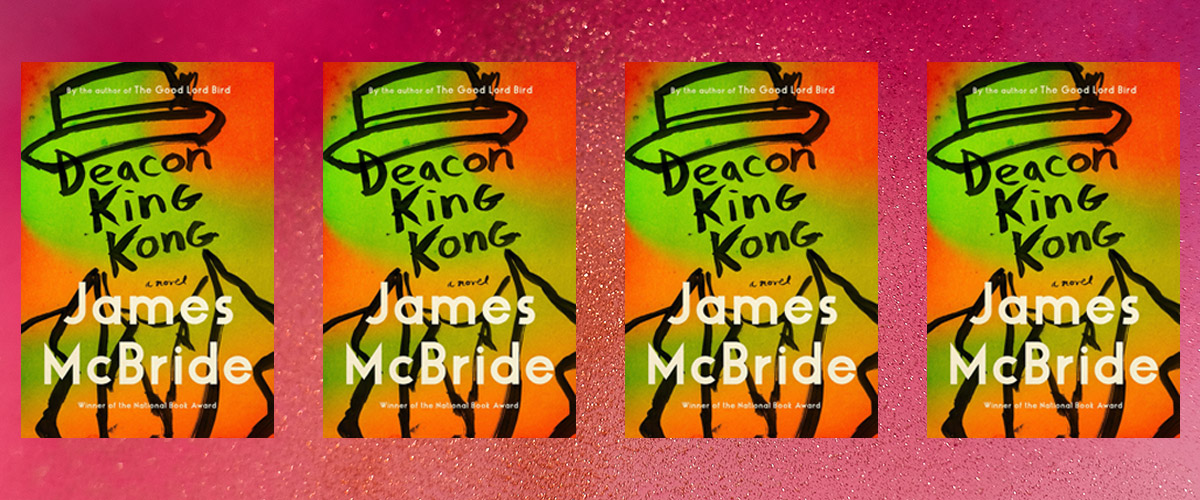
McBride is on here twice, sorry not sorry!!! I’m just gonna grab the text from Junot Díaz’s review in The New York Times Book Review: “Deacon King Kong is many things: a mystery novel, a crime novel, an urban farce, a portrait of a project community. There’s even some western in here. The novel is, in other words, a lot. Fortunately, it is also deeply felt, beautifully written and profoundly humane; McBride’s ability to inhabit his characters’ foibled, all-too-human interiority helps transform a fine book into a great one. He has written beautifully before, in his beloved memoir, The Color of Water, and, with terrifying irreverence, in his National Book Award-winning novel, The Good Lord Bird. But Deacon King Kong reads like he’s tapped a whole fresh seam of inspiration and verve. It’s clear that he’s having a blast, and his spirit of funning irreverence supercharges the entire narrative like home-brewed black lightning.”
Fun fact #2: He’s written two films, Miracle at St. Anna (2008) and Red Hook Summer (2012). Get Deacon King Kong here.
13. Easy Rawlins series by Walter Ellis Mosley
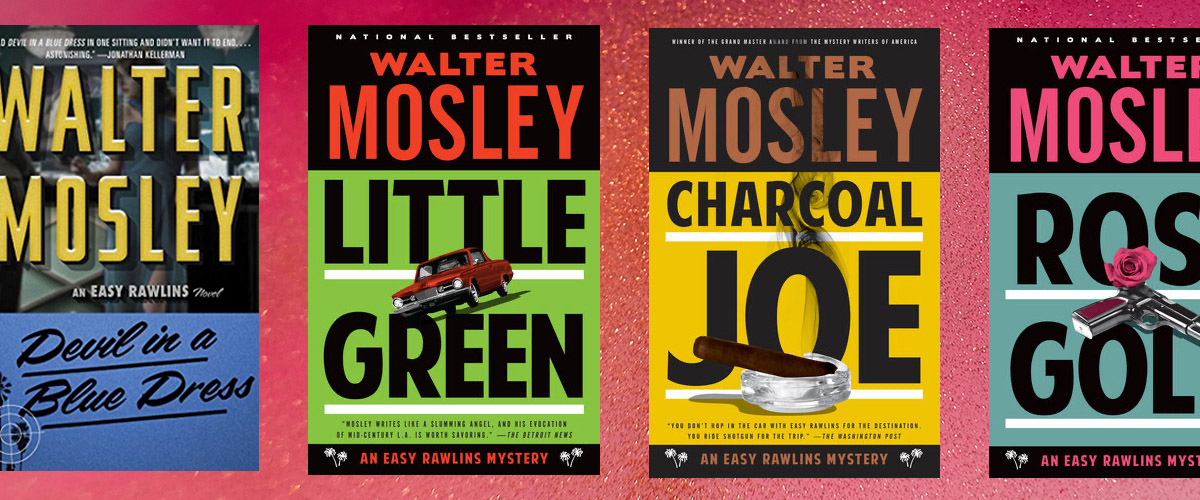
Walter Mosley, a Black Jewish crime writer, is perhaps best known for his “Easy Rawlins” series. Easy is a Black private detective in Watts, Los Angeles. Easy is the subject of his first published book — and the first in the series — Devil in a Blue Dress (fun fact: made into a movie in 1995 starring Denzel freakin’ Washington). There are now 14 novels, plus a collection of short stories, starring Easy Rawlins.
What does it mean to be Jewish? Mosley explains: “In a way, to be a Jew is to be a part of a tribe,” he said. “Being a part of a tribe, you can never really escape your identity. You can be anything inside, but in the end you’re always answerable to your blood.”
Fun fact: His Wikipedia says he “started writing at 34 and has written every day since.” Omfg. Get the first in the Easy Rawlins series here.
14. Sophie Katz mysteries by Kyra Davis

Kyra Davis grew up in Santa Clara, California, raised by a single Jewish mom. She translated her own upbringing as a Black Jewish woman into her delightful heroine, Sophie Katz, who is a Black Jewish mystery writer and amateur sleuth. She began writing as she was dealing with her own divorce, saying, “my life was falling apart and I wanted to get lost in a fictional world.” There are now seven (!!) Sophie Katz mysteries, and each one is just as fun and engaging as the last.
Fun fact: “Occasionally, when people ask me where I’m from, I’ll make up some country in Africa and act really offended if they say they never heard of it,” Davis joked. Get a Sophie Katz mystery here.
Young Adult
15. Color Me In by Natasha Díaz

Natasha Díaz’s debut YA novel, Color Me In, fictionalizes her childhood and tells the coming-of-age story of Navaeh Levitz. Navaeh is a Black Jewish teenager whose father forces her to have a belated bat mitzvah at age 16. Navaeh’s parents are in the midst of a divorce, and the bat mitzvah is her father’s way of having her stay connected to his Jewish family. Meanwhile, Navaeh is struggling to figure out her identity, her relationship to her blackness, her privilege, a blossoming relationship, and both sides of her family. It’s a compelling and timely read, and rooted in Díaz’s own lived experiences; Díaz has a white Jewish father and a Liberian and Brazilian non-Jewish mom.
When I chatted with Natasha for Alma last year, she told me, “I hope that anyone who reads it, who has felt othered, or who hasn’t felt comfortable in themselves for whatever reason, or other people don’t accept them for who they are, knows: They have a right [and] a pride in who they are and there’s nothing wrong with taking ownership of that.”
Fun fact: When Natasha was 9, she and her mom were on Oprah to talk about the experience of being a multiracial family. When Oprah asked her a question, young Natasha froze up (you can watch the video here). Get Color Me In here.
Essays
16. Bulletproof Diva: Tales of Race, Sex and Hair by Lisa Jones

Lisa Jones is the daughter of poets Hettie Jones and Amiri Baraka (known as LeRoi Jones). Jones (née Cohen), a Jewish writer, and Baraka, a Black nationalist writer, had two children, Kellie and Lisa. Lisa recalls, “I grew up thinking that I was a part of a very healthy American family and it has always amazed me when people respond to it as if it is an oddity.” Bulletproof Diva is a collection of essays, all of which were originally published in the Village Voice as part of her “Skin Trade” column. “Everything I know about American history I learned from looking at black people’s hair. It’s the perfect metaphor for the African experiment here: the price of the ticket (for a journey no one elected to take), the toll of slavery, and the costs of remaining. It’s all in the hair,” Jones writes.
Fun Fact: Lisa is not only an accomplished essayist, but she’s also a playwright and co-wrote three books with Spike Lee! Get Bulletproof Diva here.
Food Writing
17. The Cooking Gene: A Journey Through African American Culinary History in the Old South by Michael Twitty
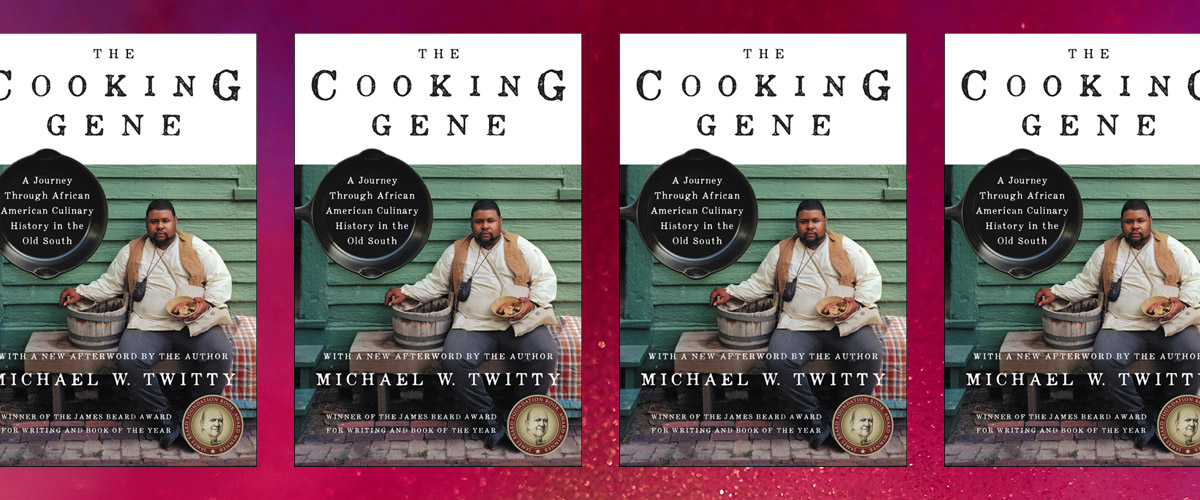
Michael Twitty is a Black Jewish writer, culinary historian, and educator. In 2010, he began blogging on Afroculinaria, a culinary history blog, and in 2011, began a project called the “Cooking Gene” which eventually became this remarkable book. As our sister site The Nosher writes, Twitty “might be the only person right now who could write such a book: Arguably the world’s only black, Jewish, gay culinarian, this ‘yid of a different color’ (his words) has resisted any attempt to categorize his work into easily digestible bites. Instead, he continues to set a rich repast of complex ideas that challenge and expand the boundaries of our traditions — and our palates.” The Cooking Gene won the 2018 James Beard Award for Best Food Writing & Book of the Year; it takes us through Southern food and food culture from Africa to America.
Fun fact: His favorite Jewish food is kasha varnishkes. Why? “I think sometimes people don’t take the time with these middle-of-the-road, classic Ashkenazi dishes. You’ve got to use fresh herbs and real schmaltz, I’m talking about globules of chicken fat in there. When you do, they become really awesome. It makes my heart sing.” Get The Cooking Gene here.
18. Do What Feels Good: Recipes, Remedies, and Routines to Treat Your Body Right by Hannah Bronfman
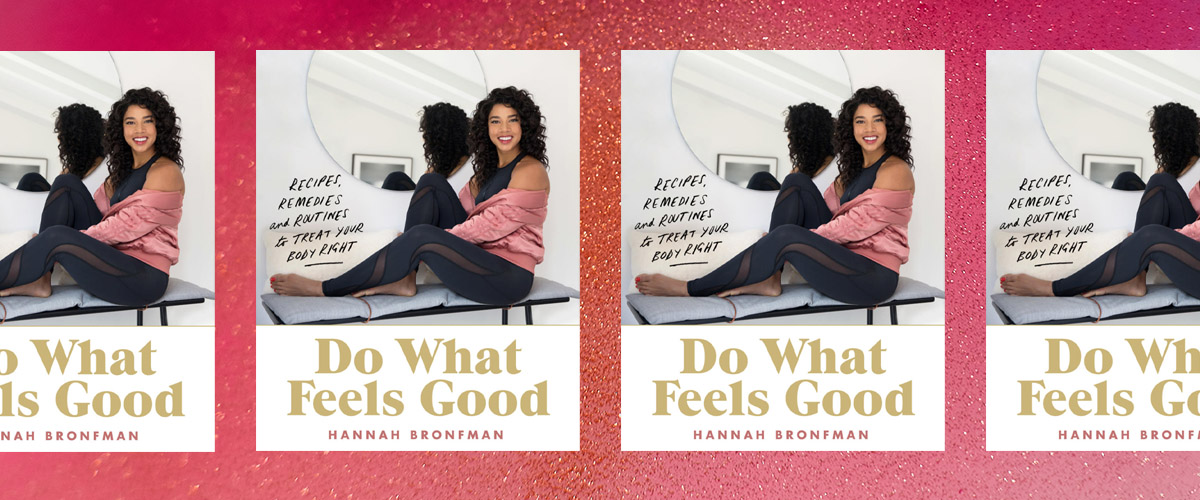
Hannah Bronfman is a woman of many talents — DJ, entrepreneur, founder of HBFIT, influencer, and writer — and her first book, Do What Feels Good, brings it all together. It’s part-cookbook, part wellness how-to, and part memoir. Hannah is vocal about creating space for Black women in the predominately white wellness space, and making wellness accessible to all. In Do What Feels Good, she gets real on her own personal journey into health and eating well.
“Growing up in NYC from a prominent Jewish family, with a very strong black mother who grew up during segregation in the south side of Chicago from a middle-class family,” Bronfman told me last year, “from a young age, I was very aware of both of these sides of myself. It can be challenging being mixed, especially in the 90s and 2000s — obviously now as well — but as a young girl, trying to figure out your identity and it being a little more complicated than most…” She trails off, soon adding, “I won’t say it was hard, and I won’t say it was easy.”
Fun fact: Hannah’s Instagram is an awesome follow. Get Do What Feels Good here.
Poetry
19. Yarmulkes & Fitted Caps by Aaron Levy Samuels
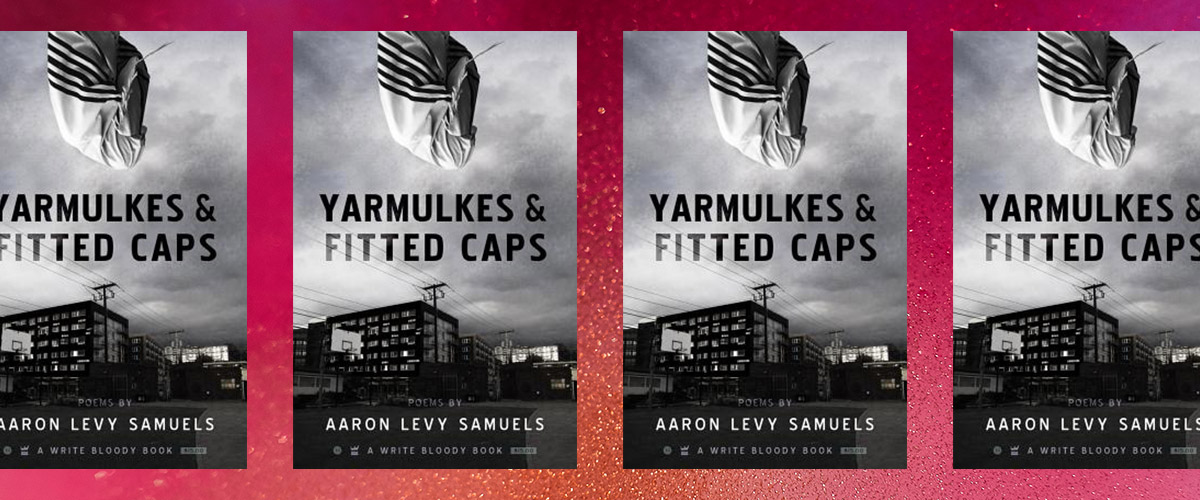
Aaron Levy Samuels is the co-founder and chief operating officer of Blavity, a digital community for Black millennials. Samuels was raised in Providence, Rhode Island by a white Jewish mother and a Black non-Jewish father, and his poems often dive into his identity. One poem, “Which Keeps Me (blackjewish),” is incredibly striking. It begins:
The black is the stain on me that everyone feels more comfortable
ignoring. The Jewish is that too. The water is the thing that keeps
me here; I am not sure if that is a good thing. When I say rope,
I mean that which coils and unfurls.
Fun fact: Yes, he knows he shares a name with Aaron Samuels of Mean Girls (2004) fame — watch his response. Get Yarmulkes & Fitted Caps here.
20. Butterflies in Fields of Corn by Dr. Tarece Johnson

Dr. Tarece Johnson is a womanist, author, activist, abolitionist, and so much more. She’s a leader in her local NAACP in Atlanta, Georgia, Alliance for Black Lives, and March on Georgia. And, yes, she writes poetry; Butterflies in Fields of Corn is her first book. But she didn’t stop there; not seeing her own experiences in the traditional Jewish prayer book, she decided to write her own. She’s written a haggadah, and Ahava, a book of poetry, meditations, and affirmations for Black Jews.
“When I made the conscious decision to convert to Judaism and as I searched for ways to connect with my new Jewish lifestyle, I needed sources that mirrored my personal choices and experiences. In the traditional liturgy, I did not find Shabbat meditation books that were focused on conversion, social justice, and the Black Jewish woman experience. So I did what Jewish women have done through the generations: I wrote a book of prayers and meditations, called Ahava,” she explained. What can’t Dr. Tarece do!?
Fun fact: Dr. Tarece has a TikTok (@dr.tarece) and it’s amazing. SERIOUSLY AMAZING. Get Butterflies in Fields of Corn here, and get Ahava here.
Got kids or nieces and nephews? Check out this Jewish antiracist reading list for children of all ages from our partner site, Kveller.
